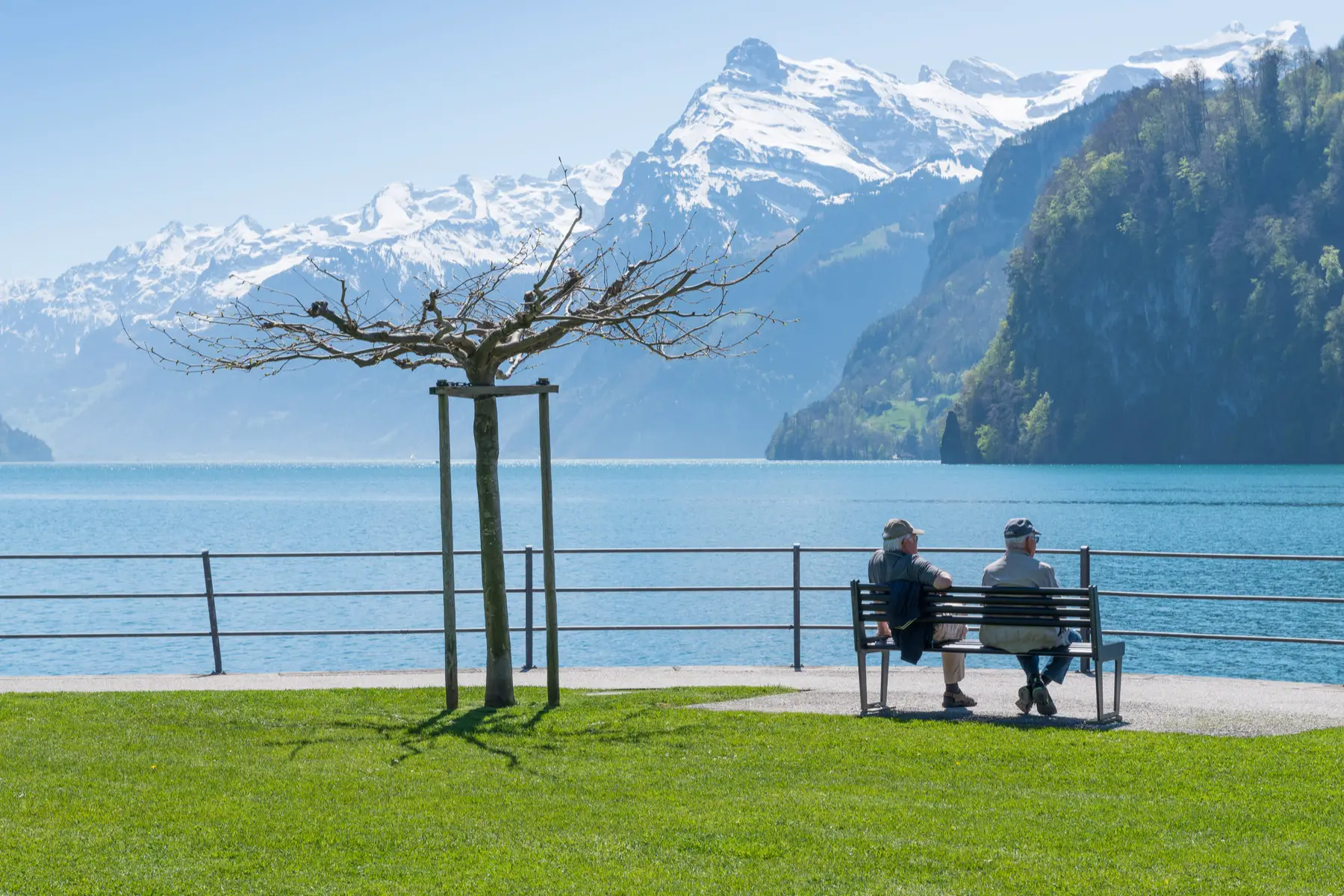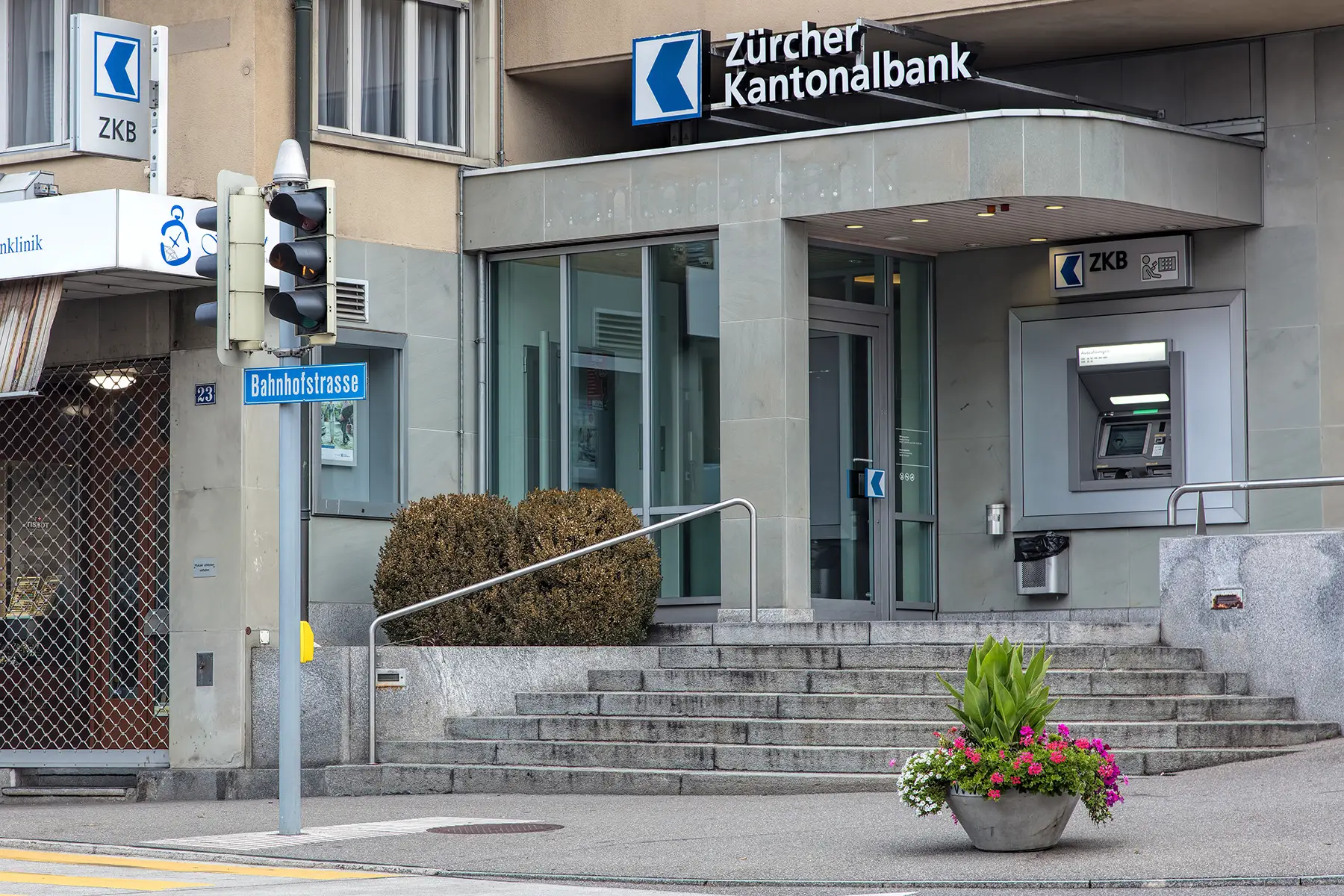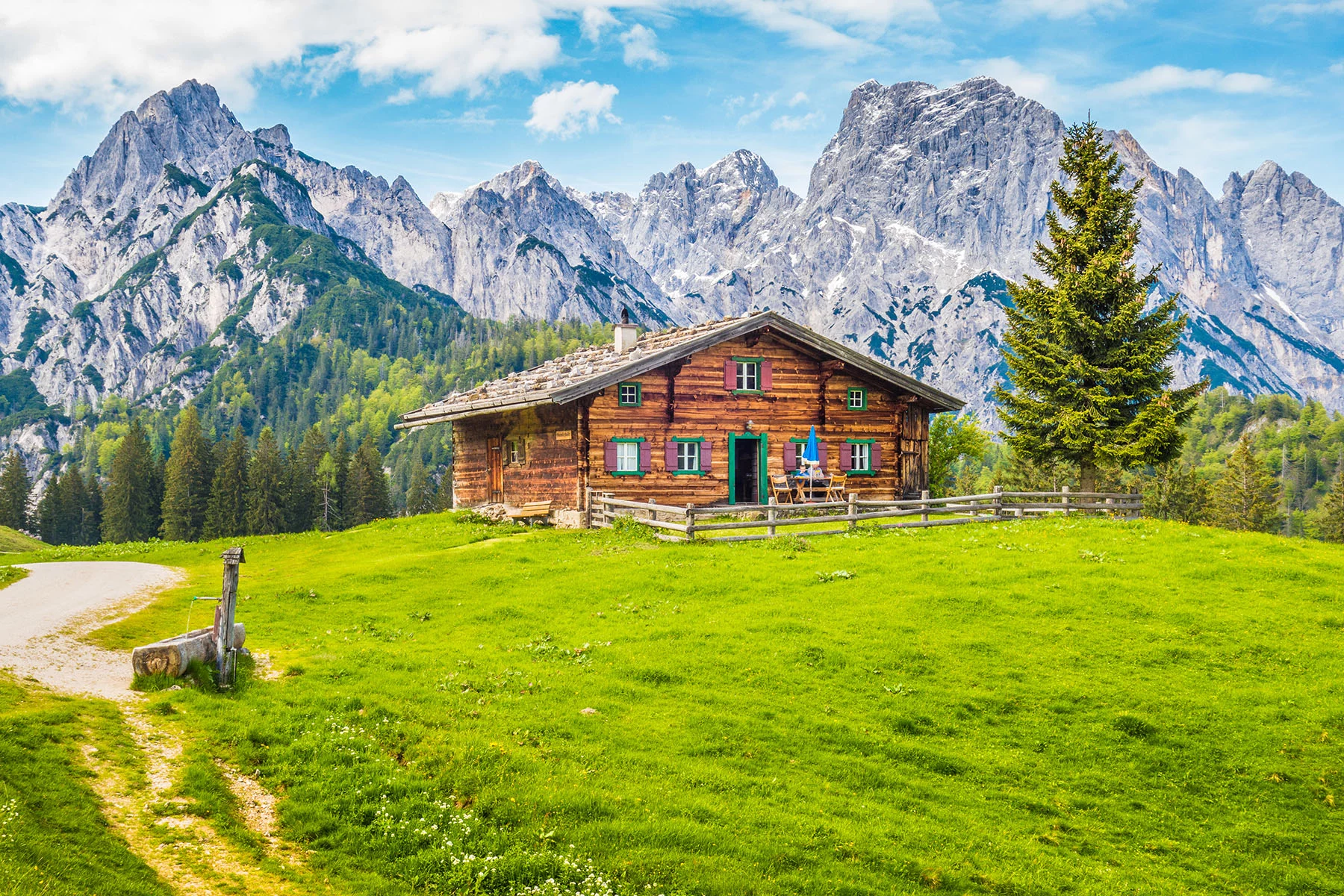With its high standard of living, excellent healthcare, and low taxes it’s no wonder so many expats retire in Switzerland. In fact, it has become so popular that the Swiss government has introduced a special retirement residency program for them.
Switzerland ranks as the second-best country to retire in the world in the Natixis 2020 Global Retirement Index.
Learn about planning your retirement in the beautiful Alpine country through the following sections:
- Retiring in Switzerland
- Who can retire in Switzerland?
- Pensions in Switzerland
- The best places for expats to retire in Switzerland
- Services, organizations, and clubs for older expats in Switzerland
- Wills and inheritance in Switzerland
- Healthcare for pensioners in Switzerland
- Other support for pensioners in Switzerland
- Useful resources
Chevrolet Consulting
Retiring in Switzerland? Navigating pension rules can be complex. Chevrolet Consulting provides expert advice on occupational benefits and administration. Marcel Chevrolet offers comprehensive guidance, personalized planning, and tax-saving strategies to make your transition to retirement run smoothly.
Retiring in Switzerland
Switzerland boasts the highest quality of life in the world, a very low crime rate, and one of the best cities for the wealthy – Zurich. It also offers political and financial stability, a robust social security system, and some of the cleanest air in the world. So, it’s no wonder expats seek the good life here. And for those looking to enjoy their retirement, few places beat the scenic Alpine nation. We’ll explain why in this handy guide.
Who can retire in Switzerland?
Fortunately, Switzerland has a relatively open policy for retirees wishing to settle in the country. That said, foreign nationals require Swiss residency to retire there. The requirements vary depending on your nationality and the Swiss canton you wish to live in.

If you are over the age of 55 and not working, you can apply for a residency permit. You must show proof that you are financially self-sufficient and have accident and health insurance. You must also have a tie to Switzerland, be that through family, property, business, or financial investment.
Switzerland is divided into 26 cantons or regions, which have autonomy over immigration in their area. This means that each foreigner must have their residency approved by the relevant Swiss canton office. For citizens from the European Union (EU) or European Free Trade Association (EFTA – Iceland, Liechtenstein, and Norway), the process is relatively straightforward due to bilateral agreements for freedom of movement.
EU/EFTA nationals, for instance, can freely relocate to Switzerland for up to 90 days without a visa. However, those planning to stay longer must register with their local Swiss canton office within 14 days of arrival and apply for a non-working residency permit.
Non-EU/EFTA nationals in Switzerland
Unlike EU/EFTA nationals, third-country nationals planning on retiring in Switzerland must meet different parameters. This sometimes means that getting Swiss residency can be more difficult. Generally speaking, non-EU citizens who are older than 55 years old can apply for a Swiss residence permit. Applications must be done through a Swiss consulate or embassy where you live.
To be granted Swiss residency, non-EU citizens must prove that they have the following:
- adequate financial resources to support their life in Switzerland
- valid Swiss accident and health insurance coverage
- proof that they are no longer pursuing gainful employment
- they can demonstrate a close connection to Switzerland; such as frequent trips, family members living in the country, past residency, or real estate. Not that simply owning Swiss property is sometimes not enough to demonstrate close ties to the country.
Each case is dealt with on an individual basis and the decision is down to the discretion of the cantonal office and your individual circumstances. You can find more information about obtaining a Swiss residence permit on ch.ch, a Swiss government website.
After residing in Switzerland for 10 continuous years, retirees can then apply for a settlement or Swiss permanent residence permit. After 12 years – or sooner if you are married to a Swiss national – you can apply for Swiss citizenship. However, in both situations, applicants must show that they have integrated socially, linguistically, and culturally in Switzerland.
Pensions in Switzerland
A vital part of retiring in Switzerland is ensuring that you have an adequate pension income to support yourself while living there. Individuals who have worked at least one full year in Switzerland and have contributed to the basic state OASI (Old Age and Survivor’s Insurance), or AHV (Alters-und Hinterlassenenversicherung in German), may be eligible to draw a state pension in Switzerland.

This can be drawn on reaching the legal retirement age in Switzerland; this is currently 65 for men and 64 for women. However, the amount will depend on the number of years and the funds that have been contributed. It may also be possible to withdraw money from occupational or private pension insurance schemes in which you have participated.
In terms of early retirement in Switzerland, those who have contributed to their AHV pension can withdraw it one to two years ahead of time. However, it is important to note that employees who have an occupational pension can only retire early if the regulations of their pension fund allow it. While the earliest retirement age in Switzerland is set at 58, exceptions do exist, and you can read more about this in our guide to the Swiss pension system. If you haven’t lived and worked in Switzerland, or don’t meet the minimum qualifying period for AHV, then you must support yourself financially by other means.
Transferring an international pension to Switzerland
A major concern for expats retiring in Switzerland is accessing their foreign pensions. However, it is possible to transfer overseas pension funds to Switzerland, and this includes state pension and personal pension funds. That said, your pensions may be subject to certain Swiss tax implications. It can also affect certain pension benefits you might receive if you stay in your home country. For example, UK pension credits are not payable in Switzerland. If you are an expat retiring to Switzerland from the United States, then double taxation may also apply.
To transfer a state pension, you need to notify your pension authority of your change in address. Transferring an EU/EFTA state pension to Switzerland from many countries is possible. If your pension is from outside the EU/EFTA, however, then it may take longer to coordinate your pension payments. For occupational and private pension investments, many providers won’t pay another country. In fact, they may even impose restrictions if you move abroad.

However, there are still options if you cannot transfer your pension payments abroad. For instance, you could retain a bank account where you receive your pension and then transfer it to Switzerland. You can read more about this in our guide on how to open a Swiss bank account. Alternatively, you could transfer your pension investments into an offshore pension scheme, such as a Qualifying Recognized Overseas Pension Scheme (QROPS), which is available for British nationals. However, these schemes must be approved by the UK tax authority, HM Revenue and Customs (or HMRC).
Offshore pension schemes also offer flexibility for accessing your funds. These may also have more lenient regulations, such as withdrawing funds before the Swiss retirement age. They also negate you from buying into an annuity fund and can be withdrawn as lump sums. Additionally, they offer favorable tax benefits such as no double taxation and lower inheritance tax.
Switzerland has a range of financial service providers, such as Chevrolet Consulting, who can help manage your wealth for your future and that of future generations.
Taxes on retirement in Switzerland
Switzerland’s status is, in essence, a tax haven. The country has relatively low tax rates, which can make your pension income go a bit further. That said, it is important to understand the Swiss tax system and the tax system in other countries where you have pension funds. Typically, once you move to Switzerland, you must declare your worldwide assets that are subject to Swiss taxes.
Taxes on pension income
Switzerland recognizes pension income as taxable income. The tax rate depends on the canton you live in and the sum of your pension income. Notably, the country has a number of agreements in place with many countries that prevent double taxes on pensions. In this case, taxes only apply in the country of residence.

As a foreigner, you can also pay a lump-sum tax when entering Switzerland. This allows individuals to request for their Swiss taxes to be based on an estimated living allowance for expenses; as opposed to their actual income and net wealth which is taxed at the current rate. However, this isn’t available in all cantons, and those which forbid it include Zürich, Schaffhausen, Appenzell Ausserrhoden, Basel-City, and Basel-Land.
Inheritance and gift taxes in Switzerland
Retirees in Switzerland may also be subject to other Swiss taxes, such as inheritance and gift tax and capital gains tax on wealth and assets. However, again, much of this depends on the canton. Fortunately, though, the transfer of wealth through inheritance is tax-free to spouses in all cantons. This is also usually the case with offspring and direct ancestors. Furthermore, while capital gains tax generally applies to profits from real estate, it doesn’t typically apply to capital from stocks or bonds.
The best places for expats to retire in Switzerland
Switzerland has a lot to offer retirees who have sufficient funds to enjoy its services. But despite being one of the more expensive countries to live in the world, some Swiss regions are cheaper than others. You can read our guide on the best cities in Switzerland for expats for more insight. But here are some of the most popular cantons where retirees choose to settle.
Canton of Vaud
If you want to live in a picturesque part of Switzerland, but not too far from a big city, then Vaud is a great choice for retiring in Switzerland. Located in the French-speaking part of Switzerland, the city of Lausanne sits on the coast of Lake Geneva with all the convenience of Geneva just a 45-minute drive away; yet still offers the peace and tranquillity of rural life.

Canton of Zurich
If finances aren’t an issue, then the city of Zurich and its surrounding regions deliver an outstanding quality of life, which, according to the most recent Mercer Quality of Living City Ranking, is surpassed only by Vienna. Boasting some of the best healthcare and cultural attractions in the country, Zurich is also accompanied by a moderate climate with cool winters and warm summers; making it highly appealing to expats.

Canton of Zug
Although it is one of the smallest cantons in Switzerland, Zug delivers breathtaking natural scenery and some of the lowest tax rates in the country, making it the ideal place for retirees planning for an affordable and quiet retirement.

Canton of Appenzell Ausserrhoden
Another small canton that is bursting with opportunities is Appenzell Ausserrhoden. Surrounded by mountains and lakes, affordable housing, low crime rates, and great healthcare, this is a top choice for those looking to retire in Switzerland.

Of course, there are many beautiful places to live in Switzerland, which each offer their own unique qualities and charm, depending on the kind of lifestyle you are looking to enjoy in the country.
Services, organizations, and clubs for older expats in Switzerland
Luckily for expats, there are plenty of English-speaking communities in Switzerland that can help you adjust to Swiss life, whatever your age. The American International Club of Zurich, for instance, is a wonderful organization that helps members integrate into their new community. They host regular networking events and offer many opportunities for members to volunteer in their local community. The Swiss Rotary Club is another wonderful option that can help expats foster new friendships by attending weekly meetings and building international relationships.

Of course, it can take time to find your place and integrate with the locals, so one of the best options is to get involved with local groups that share your interests. Meetup and expat groups on Facebook are also great resources. There are also numerous expat groups throughout Switzerland that focus on everything from learning languages to visiting the theatre.
Wills and inheritance in Switzerland
If you retire in Switzerland and pass away there, you may be subject to inheritance tax. However, this is generally tax-free to spouses and your children. Individuals from countries with bilateral agreements with Switzerland, on the other hand, may have to pay inheritance tax in their home countries instead.
You should also check which inheritance laws apply to your assets. Usually, if you have a will that has been drawn up in your country of citizenship – even if it covers assets in Switzerland and worldwide – the Swiss authorities will defer to the law of the country of nationality. There are exceptions, however, so seeking legal advice from a professional when drawing up your will is always a good idea.
Healthcare for pensioners in Switzerland
Switzerland has world-class healthcare, which is an attractive selling point for expats retiring in Switzerland. However, this comes at the expense of compulsory Swiss health insurance, which all official Swiss residents must get. Typically, foreign nationals must prove that they have valid accident and health insurance when applying for a Swiss residency permit. After your residency is approved, you have three months to purchase compulsory health insurance and accident insurance upon entering Switzerland.

After registering for Swiss health insurance, you will need to make monthly payments. Your insurance stipulates your annual deductible amount. Swiss health insurance also includes a retention fee, whereby the individual must contribute 10% towards the insurer’s cost. This caps at CHF 700 for adults and CHF 350 for children per year. Individuals also need to pay hospital contributions of around CHF 15 per day.
It is worth noting that the price of Swiss health insurance can vary widely; especially if you choose to purchase supplementary health insurance that may cover you for treatments that aren’t included in the basic health insurance. In addition to health insurance, all Swiss residents must have accident insurance to cover medical costs in the eventuality of an occupational or non-occupational accident. While employees typically get coverage from their employer, non-working individuals must take out a personal insurance policy and pay a monthly premium; or add it as a supplement to a private insurance plan.
Other support for pensioners in Switzerland
For more details on Swiss healthcare for retirees, you can read our guides to healthcare and health insurance in Switzerland. The Swiss government also provides information on benefits under basic insurance and accident insurance, along with tools to help you find authorized insurance companies in your canton. To fully enjoy retiring in Switzerland, it is important to prepare your move in advance, keeping in mind the following tips:
Make sure you’re comfortable
Through its rich culture, great outdoors, benefits, and great healthcare, Switzerland offers retirees a fantastic quality of life. However, the country has a high cost of living, particularly in Zurich, Geneva, and Bern. So before you make a final decision to move there, consider if your budget allows a comfortable Swiss retirement.
Plan for an adventure
There is an abundance of beautiful places to see and exciting festivals to visit in Switzerland. The country’s convenient location in central Europe also means that you have an array of great destinations on your doorstep. Furthermore, the great outdoor Swiss lifestyle will help you to keep physically fit and healthy.

Enjoy the feeling of safety
Switzerland is also one of the safest places you can live, with very low crime rates and political stability. This is particularly true of Zurich, Basel, and Bern, which are some of the safest cities in the world. You can read more about Switzerland’s crime rates and legal system in our guide. You can also read some surprising facts about Switzerland to discover the big impact this small country has.
Immerse yourself in society
Moving abroad can leave expats feeling culture-shocked, isolated from their grandchildren abroad, and lonely to begin with. But integrating into the local community and finding ways to overcome your problems is a great way to settle in. Whether you join a sports group, Swiss language school, or an expat community, the possibilities are endless – so enjoy!






